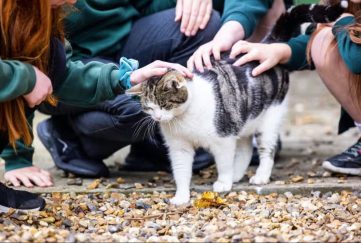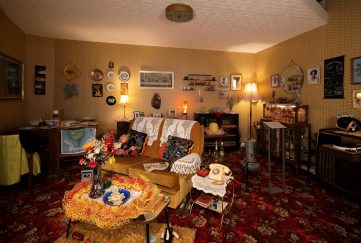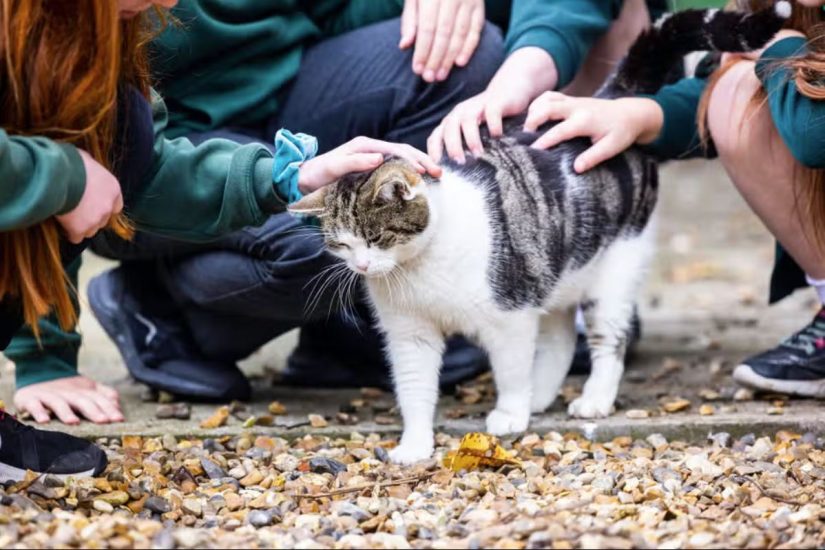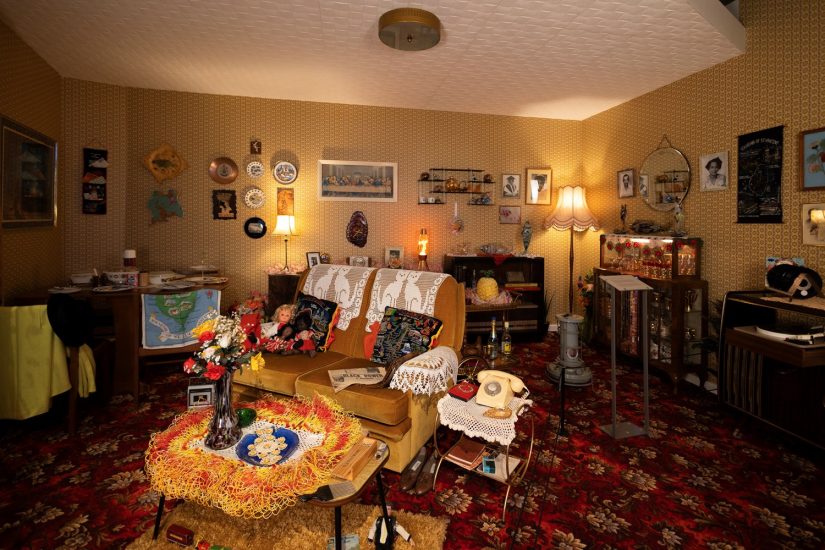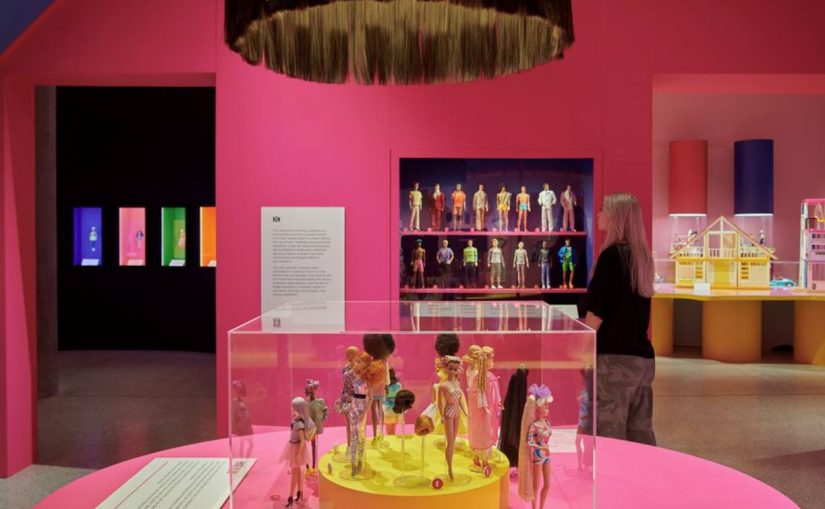“The MacPeever’s Christmas Cards”
Mr MacPeever came home, after an unaccountably long absence, wearing a toilworn look.
The cause of it appeared to be the brown paper parcel under his arm.
It might have weighed four pounds, or again it might not, but he stage-managed it it with the effect of at least four hundredweights.
No professional strongman could have dropped his 500-pound barbell more theatrically than MacPeever slammed down his package on the table.
H was only playing to a gallery of one — his wife — but she refused to be impressed.
“I suppose that’s a bit steak ye’ve brocht hame for your supper,” she commented, disconcertingly.
“Do ye, indeed?” snorted MacPeever, disgustedly. “Efter the bother I’ve had gettin’ this confounded thing, and luggin’ it hame to ye — but there, I propose to treat your scurrilous remark wi’ silent contempt.”
And as he thought up a paragraph or two of contemptuous silence, he busied himself undoing the parcel.
What it contained was a sample-book of private Christmas cards, obtained at Mrs MacPeever’s suggestion. MacPeever himself was prejudiced against Christmas cards, hence the grudging nature of his service.
“Noo, then, Jean MacPeever,” he declaimed, “approach and view my latest treebute to your ambeetion. Seein’ ye were determined to circularise your freends wi’ your nwe address (and a loose-fittin’ ready-made sentiment thrown in), I consented in a weak moment to pander to ye.
“But, oh, the dreary miles I’ve traivelled huntin’ for a shop where they wud trust the sample-book oot o’ their sicht. The stationers pay half-a-croon a piece for them, it seems, and money wudna buy them.
“In one shop they had it chained to the coonter like a Post Office pen. And it was only when I trudged, weary and footsore, into Wattie Wilkie’s Emporium—”
“Hoo in the wide would did ye no’ go there furst and it only twa meenutes awa’?” cross-examined Mrs MacPeever unsympathetically.
Though MacPeever hadn’t mentioned the fact, he had gone there first, and had wasted his own and Mr Wilkie’s time arguing about football — but don’t let us interrupt. Mrs MacPeever will do all that is necessary in that disrespect.
“It was only when I got there, Jean,” pursued Mr MacPeever, unswervingly, “that I met wi’ my first faint gleam o’ success.
“There werena very mony customers in, so I telled him a’ aboot my peetiable plight. Hoo that the wife was fair set on havin’ her name printed on her Christmas cairds this year, wi’ the address in bold type, so as to let folk see we’d flitted to a better pairt o’ the Dumbarton Road, mair refined like, and grander, and so forth, wi’ an extra room and a scullery and a wash-hoose a’ to oorsel’s—”
“Surely to guidness ye didna go bletherin’ a’ this to the man!” broke in Mrs MacPeever, much perturbed. Not that she could deny the thought-germ of the idea thus appallingly disclosed; but she had never dreamed MacPeever could be so foolish as to blurt out her secret policy like that.
“What for no’?” queried MacPeever, amazedly.
Inwardly he was delighted that his ruse had brought about a breathless attention to the story of his own personal trouble in the matter.
“What for no’!” echoed Jean, aghast. “What wud Wattie Wilkie think? What wud the customers think?”
“I dinna ken what the customers would think, but Wattie Wilkie thocht ye were wantin’ a’ thae details o’ oor new hoose printed on the cairds.
“He began tellin’ me that there was naething but the bare address allooed for the money, and that if ye were wantin’ to work in a buildin’ specification wi’ your Christmas greetin’, he wud hae to write up for an estimate—”
“Oh, ye senseless, haverin’ putty-heid that ye are,” burst in Mrs MacPeever enraged beyond endurance; “hoo I wish I’d never gi’en ye this job to do —”
“I was wishin’ the same thing mysel’, Jean, a’ the time. There I had been tourin’ aboot, offerin’ untold pretexts for gettin’ a sample-book awa’ wi’ me. And the untold rebuffs I’d got were fair unspeakable.
“In one case I’d put forward the pathetic plea that the pairty wha wanted the book was quite respectable, seein’ she lived in the same hoose as mysel’, but that she was sufferin’ frae a highly infectious form o’ leprosy, and wasna allooed oot.
“I even offered to leave my umbrella in the shop as a kind o’ hostage. But wud ye believe it, Jean? I was practically hounded oot o’ the place. And when I peered wistfully in five meenutes later I saw the man disinfectin’ my very footprints wi’ insect powder.
“So that, compared wi’ the like o’ that experience, Wattie Wilkie’s Emporium was a haven o’ rest.”
“I hope they shoved ye off frae your moorin’s afore ye got babblin’ enough to hang ye.” Mrs MacPeever’s affectionate solicitude was truly touching.
“Weel,” continued Mr MacPeever, unctuously, “I replied to Wattie Wilkie, sort o’ resigned like, that he needna ask me what ye were wantin’; that for the life o’ me I couldna tell him ony mair than ye could yoursel’ if ye were put to it.
“(Ye see, Jean, I had to shuffle oot o’ that extra printin’ misunderstandin’ somehoo). But there was one thing certain aboot ye, I added, wi’ affectin’ loyalty, and that was that if I went hame withoot a sample-book ye wud near bring the hoose doon aboot my ears—”
“Ye ought to be ashamed o’ yoursel’, Colin MacPeever,” censured Jean, irately, “goin’ on that wey to folk aboot your puir wife.”
“Wheesht, woman, I was only drawin’ him. Ye should hae heard what he said aboot his one.”
“Yea, Colin?” encouraged Mrs MacPeever, calming down to listen to the prospective tit-bit.
“Ay, Jean,” nodded MacPeever, mysteriously. “Lurin’ my furtively aside, he was mutterin’ that the women-folk were a’ alike, and that Mrs Wilkie was just the very de——, when the subject o’ his discourse emerged frae the back-shop.
“To gie him every credit for his presence o’ mind, he stopped mumblin’, and feenished his remark in a clarion voice. ‘Mrs Wilkie,’ quoth he, ‘was just the very dearest and best o’ wives that ever a man was blessed wi’—”
“Mph!” sniffed Jean, disappointedly, “if that was a’ ye drew oot o’ him in exchange for your slanders aboot me, ye got very little change back oot o’ your base coin.”
“Ah, but his forced inflection, Jean, was painfu’ to listen to. And his hunted look was awfu’ to witness. So was the wink he gae me when I responded, in the language o’ diplomacy, that we could baith say the same thing when it cam’ to that ony wey.
“And as the puir cratur wrapped up this sample-book at the back o’ a showcase I could weel imagine the parcel gettin’ splashed wi’ a silent tear.”
MacPeever turned over the brown paper, by way of looking for the silent tear, but it had apparently evaporated.
“He wudna splash the book enough to blur the prices oot, I’m thinkin’.” So sarcastically conjectured Jean, as she grabbed over the sample-book for inspection.
And for a full minute, while she churned amongst the various designs, nothing was to be heard in the way of dialogue but a profound silence on both sides.
At the end of that lengthy period, Mr MacPeever grew impatient. He was no doubt anxious to get his labour of Hercules completed by the return of the book to the Emporium whence it came.
“I wish ye wud hurry up, Jean,” he chafed, fidgeting about in the doorway. “Ye dinna need to study thae parboiled mottos and compliments as if ye had to pass an examination in them.”
“Sit doon on a chair, MacPeever, and tie yoursel’ in,” advised Jean, considerately. “I’m no’ goin’ to hurry the book back ony faster than ye hurried it here. I wonder if I should select a Christmas greetin’, or a combination o’ Christmas and New Year.”
“Gie them every benefit ye can squeeze in for the money, Jean,” counselled MacPeever, lavishly. “Wish them a merry Christmas and a glad New Year, wi’ mony happy returns o’ birthdays, paydays, bank holidays, and Saturday efternoons if there are forms for the purpose.”
“I think I will,” murmured Jean, abstractly, referring to the spirit of his advice rather than the letter. “Do ye think oor English freends wud understand a Scotch motto on the ootside? ‘For auld lang syne’, for instance?”
“Wi’ an obscure quotation like that,” gibed MacPeever, “I wud enclose the translation, ‘for old long since’, to mak’ sure.
“I marvel at ye, Jean! Do ye suppose an intelligent race like the English folk dinna ken their own language wi’ the breeks off and the kilt on?
“When they see a Gordon Highlander swaggerin’ down Piccadilly, do ye think they tak’ him for a Malay? No. They ken Scotch weel enough in tongue, print, kilt, or bottle.
“Why, they even go to the length o’ studyin’ Scotch dialect for the express purpose o’ retailin’ the Scotch joke and readin’ the kailyard novel.”
But Jean was only half convinced.
“I’d maybe better compromise on a kind o’ easier one,” she murmured doubtingly. “What do ye think o’ this, Colin? ‘Should auld acquaintance be forgot?'”
“I think it’s whiles justifiable, and even desirable, to forget some o’ them,” replied MacPeever, densely. “Although, on the other hand, I’ve a guid twa or three auld acquaintances wha seem to hae forgotten that they owe me money.”
Failing to get settled convictions on this specimen question from her husband, Jean strayed over a few more pages.
“Here’s a terrible pretty one in plain English,” she commented presently, and commenced to read — ‘May every choicest gift be thine, this merry Christmastide’ —”
“At a’ costs, Jean, up to seeven and six the dizzen, let’s steer clear o’ that terrible — if pretty — one.” Thus appealed MacPeever, roused from jeering apathy to open hostility.
“If ye’re goin’ to spread that specious humbug broadcast among oor freends, my name doesna appear on the cairds.
“Ye can tell them I’ve scratched, and that I’m struck oot o’ a’ engagements. I fancy I see mysel’ subscribin’ to a sardonic wish like that, and postin’ twenty-five or fifty replicas o’ the hollow mockery to plain folk just like oorsel’s. The idea’s rideeculous.
“They canna a’ hae every choicest gift, but if ye put the notion into their heads that they deserve them, they’ll hold ye responsible if they dinna get them. And naething short o’ a shooer o’ diamond necklaces and motor cars wud satisfy the maist o’ them.”
“Weel, weel, then, Colin, what do ye say to the ‘auld acquaintance’ one, wishin’ them the compliments o’ the season inside?”
“If they dinna tak’ ower mony o’ the said complements o’ the season inside, there’ll be little hairm done — if precious little guid. ‘Auld acquaintance’ ‘ll be a misfir in some cases, for we’ve only kent the Blairs a maitter o’ three weeks, and I’ve never even seen your new freends the Clunesses.
“Hooever, for uniformity, I supposed they’ll hae to join the glad throng o’ recipients. But,” here MacPeever relapsed into a moody retrospect, “what rash act o’ folly it wud hae been if I’d allooed mysel’ to electrify Mrs Blair, for instance, wi’ the despairin’ cry, ‘May every choicest gift be thine’.
“She’d hae concluded to a certainty that it was a mock valentine—”
“The design’s an awfu’ sweet one —”
“She micht believe oor intentions were honourable enough, I daursay,” admitted MacPeever, obtusely. “I’m no denyin’ that, but —”
“I’m talkin’ aboot the floral design on the ‘auld acquaintance’ caird, ye wudden-heid,” explained Jeam, curtly.
“Oh, if ye’re runnin’ the affair on the principle o’ a flower show, ye can award it ‘highly commended’. I’ll gie the rest of the exheebit ‘highly condemned’, and the job’s feenished.
“Hoo mony do ye want? Ca’ canny, noo, for I hereby decline in advance to write mair than half the addresses. Twenty-five’s mair than twa dizzen ower mony.”
“Ye’d better get fifty, Colin —”
“As bein’ mair suited to the rank o’ a retired grocer and his wife, like?”
“No; so’s to include everybody we’ll need to mind.”
“So’s to include everybody we mind, and hae some left ower for the puir auld acquaintances we forget, but wha send us a caird a’ the same. A’richt, Jean. Let me tak’ back the book and get the farce ower for anither year.”
“There’s naethin’ farcical aboot it, ye cantankerous mugwump. What else wud ye do?”
“I’ll show ye what else I’m goin’ to do, a’ in good time. Pasteboard’ll do weel enough for the rank and file o’ oor joint acquaintance, but I’m goin’ to send each o’ my real auld personal freends, especially if they’re no’ in Scotland, something o’ value.”
“Ye needna think that on that pretext ye’ll be allooed extra pocket money this Christmas,” protested Jean warningly.
“I’ll manage to enjoy mysel’ a’ the same, guid-wife,” prophesied Colin, confidently. “My wee bit presents’ll no’ mak’ a big hole in the pittance ye’re intendin’ to dole oot to me, sma though it be. But I’ll bet they’ll be mair appreciated than the cairds. And my gifts’ll only cost a penny each —”
“I thocht ye said something o’ value. I suppose some articles o’ vertu like monkeys-on-sticks. If ye’re goin’ to spend a whole penny each on them, I wud send on the money and let them buy what they like.” So scoffed Jean.
“My penny presents’ll be o’ mair value than ye think, Jean,” maintained MacPeever, haughtily. “I may tell ye that each o’ them will be a wonderful pennyworth o’ a paper that the puir, far-awa’ bodies are no’ likely to see unless I send them.
“Your name’s mentioned in it — I regret to say, no’ muckle to your credit — so ye’ll see the drift o’ my idea.”
“Oh, the ‘People’s Friend’, of coorse, where ye’re gettin’ regularly shown up in your true colours. I wonder ye’re no’ ashamed o’ the figures ye cut.”
“Merely the customary exaggerations o’ the press, Jean. I’ll suffer them in silence so long’s you conteenue to get the worst o’ it, as they tell me ye do. But it’s no’ the ‘People’s Friend’ I was alludin’ to. It’s the ‘People’s Friend’ Christmas Number. There’s a game in it I want to popularise.
“It shows hoo puir, doon-trodden man, mairried, single, and the reverse, can beat prood woman at her own favourite game — ‘the Last Word’. It’ll be a great help and solace to my affleected fellow-men, and it’ll exasperate the women-folk extra-ordinary.”
“Awa’ ye go back to Wattie Wilkie, and greet doon his neck about your affleections. Silent tears’ll fit ye best.
“But incidentally, see that ye order thae Christmas cairds a’ correct, or I’ll keep the price o’ a fresh lot off your pocket money.”


